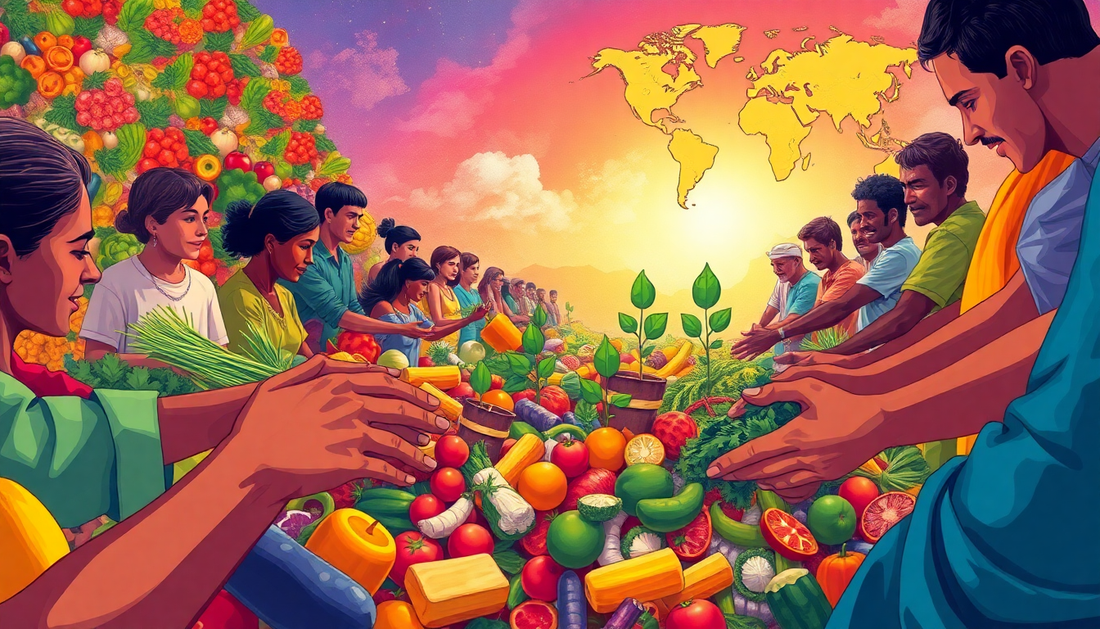Food waste has emerged as a pressing global issue with far-reaching environmental consequences. As the world grapples with the challenges of sustainability and climate change, the staggering amount of edible food that ends up in landfills or is otherwise discarded has become a significant contributor to the degradation of our planet. In this comprehensive blog post, we will delve into the scale of food waste, its multifaceted environmental impact, and the sustainable solutions that individuals, businesses, and communities can adopt to mitigate this pressing problem.
The Staggering Scale of Food Waste
According to the United Nations Food and Agriculture Organization (FAO), approximately one-third of all food produced globally for human consumption is lost or wasted each year. This equates to a staggering 1.3 billion tons of edible food that never reaches the plates of consumers. The scale of this issue is truly astounding, with food waste occurring at every stage of the supply chain, from agricultural production to household consumption.
The breakdown of food waste across different sectors is equally alarming. The FAO reports that in industrialized countries, the majority of food waste occurs at the consumer level, with households accounting for nearly 60% of all wasted food. In developing nations, however, the bulk of food waste takes place during the earlier stages of the supply chain, such as agricultural production, post-harvest handling, and storage.
The economic and environmental implications of this rampant food waste are profound. Globally, the cost of food waste is estimated to be a staggering $1 trillion per year, a figure that encompasses the resources, labor, and energy invested in producing food that ultimately goes uneaten. From an environmental perspective, the consequences are even more dire, as the production and disposal of wasted food contribute significantly to greenhouse gas emissions, water scarcity, and land degradation.
The Environmental Impact Dimensions of Food Waste
The environmental impact of food waste is multifaceted and far-reaching, touching on several critical dimensions that threaten the delicate balance of our planet.
Greenhouse Gas Emissions
The production, transportation, and disposal of wasted food are major contributors to global greenhouse gas emissions. When food ends up in landfills, it decomposes and releases methane, a potent greenhouse gas that is up to 28 times more effective at trapping heat in the atmosphere than carbon dioxide. Estimates suggest that if food waste were a country, it would be the third-largest emitter of greenhouse gases in the world, behind only China and the United States.
Water Resource Depletion
The production of food requires significant amounts of water, and when that food is ultimately wasted, the water used in its cultivation is effectively squandered. The FAO estimates that the water footprint of global food waste amounts to approximately 250 cubic kilometers per year, which is more than the annual flow of Russia's Volga River.
Land Use and Deforestation
The land used to grow crops that end up being wasted could have been utilized for other purposes, such as preserving natural habitats or growing food that would actually be consumed. Additionally, the clearing of land for agricultural production to support food waste contributes to deforestation, which has devastating consequences for biodiversity and the overall health of ecosystems.
Carbon Footprint of Wasted Food Production
The energy, resources, and emissions associated with the production, processing, transportation, and storage of wasted food all contribute to a significant carbon footprint. Estimates suggest that the carbon footprint of global food waste is approximately 3.3 billion tons of carbon dioxide equivalent, which is comparable to the annual greenhouse gas emissions of a country the size of India.
Waste Management Challenges
The disposal of food waste poses significant challenges for waste management systems around the world. When food waste ends up in landfills, it contributes to the generation of methane, a potent greenhouse gas that is a major driver of climate change. Additionally, the decomposition of food waste in landfills can lead to the leaching of harmful chemicals and pollutants into the surrounding soil and water sources.
Many waste management systems are ill-equipped to handle the volume and complexity of food waste, often relying on inefficient processing methods that fail to capture the full value of the discarded materials. Composting and anaerobic digestion, which can transform food waste into valuable soil amendments or renewable energy, are often underutilized or underdeveloped in many regions.
Sustainable Solutions
Addressing the environmental scourge of food waste requires a multifaceted approach that involves the collective efforts of individuals, businesses, and policymakers. Here are some of the sustainable solutions that can be implemented to reduce food waste and mitigate its environmental impact:
Reducing Food Waste
Implementing strategies to reduce food waste at the source is a crucial first step. This can involve improving supply chain efficiency, optimizing inventory management, and educating consumers on meal planning, proper food storage, and the utilization of leftovers. Businesses can also play a significant role by implementing food donation programs, adjusting portion sizes, and exploring innovative packaging solutions like those offered by Builditfy's eco-friendly cutlery.
Composting and Recycling
Diverting food waste from landfills and instead channeling it into composting or anaerobic digestion systems can significantly reduce methane emissions and create valuable soil amendments or renewable energy. Governments and municipalities can invest in the infrastructure and education necessary to make composting and recycling more accessible and widespread.
Community and Individual Actions
Empowering individuals and communities to take responsibility for their food waste can have a profound impact. This can involve initiatives such as food rescue programs, community gardens, and educational campaigns that promote sustainable consumption habits and responsible food management practices.
Technological Innovations
Advancements in technology can play a crucial role in addressing food waste. From smart refrigerators that monitor expiration dates to mobile apps that connect surplus food with those in need, innovative solutions can help streamline the food supply chain and reduce waste.
The Role of Businesses and Consumers
Businesses and consumers alike have a critical role to play in combating the environmental scourge of food waste. Businesses can lead the way by implementing sustainable practices, such as optimizing inventory management, offering eco-friendly packaging solutions like Builditfy's reusable cutlery, and partnering with food rescue organizations.
Consumers, on the other hand, can make a significant impact through their purchasing decisions and household food management practices. By embracing sustainable consumption habits, such as meal planning, proper food storage, and the utilization of leftovers, individuals can reduce their personal food waste and contribute to a more sustainable future.
Future Outlook and Collaborative Efforts
As the world grapples with the pressing challenges of climate change and environmental degradation, the issue of food waste has emerged as a critical battleground. While the scale of the problem is daunting, there is reason for cautious optimism. Emerging trends in waste reduction, such as the growing popularity of composting and the development of innovative technological solutions, suggest that progress is possible.
Ultimately, addressing the environmental scourge of food waste will require a collaborative effort on a global scale. Governments, businesses, and individuals must work together to implement comprehensive strategies that prioritize sustainable food systems, efficient waste management, and a collective shift in mindset towards responsible consumption. By taking action now, we can pave the way for a more sustainable and resilient future, where the precious resources invested in food production are not squandered, but rather harnessed to nourish both people and the planet.

